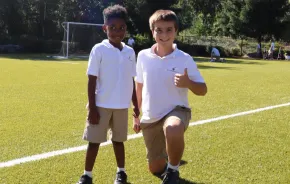
If managing your kids' schedules during unexpected time off is running you ragged, you may want to consider online options. Apps, websites and even full-fledged virtual camps offer a wide range of learning opportunities, and can provide the ideal activity during a "staycation" or a fill-in between other activities.
Online learning also gives kids something unique: individual attention. You, a babysitter, a grandparent, or even an older sibling act as virtual camp counselors, leading — and even learning alongside — your kids. With many of the virtual camps below, you can mix and match activities to tailor the experience to your kids' interests. Expect to be more involved if you go for the free, choose-your-own-adventure camps. But fee-based camps call for some adult participation, too. Check out these offerings:
Choose-your-own-adventure camps
Kanopy; free; ages 3 and up
As long as you have a library card, you can access all the free entertainment and educational videos this app has to offer. Most of the content choices on Kanopy are similar to what patrons of a well-stocked library would expect: well-selected, award-winning films; independent and foreign films; popular kids' and adults' TV series; educational shows. The animated books are top-quality, with classics from producers such as Scholastic and Weston Woods.
MarcoPolo World School; free to try, then $9.99 per month; ages 4 and up
This early learning video and game app emphasizes STEAM skills (science, technology, engineering, art and math). Kids choose from a list of favorite subjects and watch a related topic-based video, which is then followed by a game. Parents and kids can view the monthly calendar to see what new topics are being added to the app, and parents can view kids' progress.
Start with a Book; free; ages 6 and up
In addition to a summer science camp, this site offers a long list of themes, such as Art, Night Sky and Weather Report, for kids to explore. For each theme, you get book suggestions (for all reading levels), discussion guides, hands-on activities, and related sites and apps. You'll need to shell out for books if you can't find them at the library.
PBS Parents; free; ages 3–9
With an emphasis on summer reading, the PBS Parents' site offers a variety of practical, step-by-step plans to incorporate books into the dog days of summer. In addition to the downloadable Summer Reading Chart and the "Summer Bucket List" to a free downloadable activity book, you can use the Super Summer Checklist PDF to plan hands-on experiences.
DIY; free and fee-based; ages 7 and up
This site offers dozens of skill-based activities (which it calls "challenges") in a variety of categories, including Art, Business and Engineering, that kids can do year-round. Every summer, DIY runs camps and shorter courses. Some of the camps have online counselors who interact with your kid. Sign up to get notified of the latest offerings.
Code with Google; free; ages 12 and up
A wide range of projects, including making emojis, animating GIFs and composing music, is designed to ignite a passion for coding in teen girls. (There's no stopping boys from doing these projects, though.) The site offers inspiration stories from female tech mentors as well as ideas to make coding social, such as a coding party kit.
Google Arts & Culture; free; ages 12 and up
Google Arts & Culture puts the worlds of art, science, history and travel at your fingertips. In addition to letting you take a selfie and compare your face to images from great works of art, it also lets you find information about artists, museums, historic figures, places and historic events.
Make: Online; free (materials cost extra); ages 14 and up
The folks behind the maker movement offer weekly camps based on themes such as Far Out Future and Flight. You get a PDF with daily activities that support the theme, such as making slime and designing and flying kites.
CreativeLive; variable cost; ages 14 and up
CreativeLive is a collection of educational video courses, ranging from photography to personal growth. The lessons aren't necessarily aimed at teens, but most of the content is fine for kids who are interested in adding new skills, such as Photoshop, to their resume.
Structured learning
Khan Academy; free; ages 5 and up
While Khan Academy doesn't offer specific camps, it provides meaningful, step-by-step exploration in a variety of topics, including math, science, the arts and humanities. Kids can sign up with a coach (a teacher, parent, or tutor) who can monitor their progress and suggest lessons. Kids also can earn badges by learning and teaching. The custom dashboard has a progress map that fills up as kids work their way through the skills.
Brain Chase; $99, extra for electives; ages 8–14
Created by two parents who were looking for a way to help their kids continue learning during summer, Brain Chase takes a creative approach to enrichment. Kids work on math, reading and typing all while competing in a real-life treasure hunt for the chance to win a $10,000 scholarship. Check website for start date.
Camp Wonderopolis; free for campers; optional $25 instruction guide for parents; ages 7 and up
Sponsored by the National Center for Families Learning (NCFL), this online camp lets kids explore topics such as weather, food and technology. Each topic includes lessons, outdoor activities, videos and additional reading suggestions for all ages. The 2020 theme is Build Your Own Wonderocity, where families explore the wonders of construction and engineering in 42 lessons.
Connected Camps; prices vary for each different class; ages 8–13
For tech-curious kids, check out Connected Camps, which offers week-long, instructor-led, Minecraft-based camps including coding, game design and engineering. There are also courses in Minecraft and the Scratch programming language just for girls.
iD Tech; online private tutoring lessons; 1 hour lessons $55, with savings the more lessons that are booked; ages 7–19
At iD Tech kids can learn to code, discover AI. Mod Minecraft, create with Roblox or develop a video game with Unreal. Your child can choose from one of these themes, or customize their own. With one-on-one tutoring from iD certified instructors, kids will build in-demand skills and create a personalized project.
Editor’s note: This article was originally published by Common Sense Media in June 2019, and updated in June 2020.











